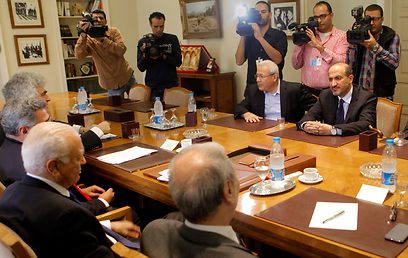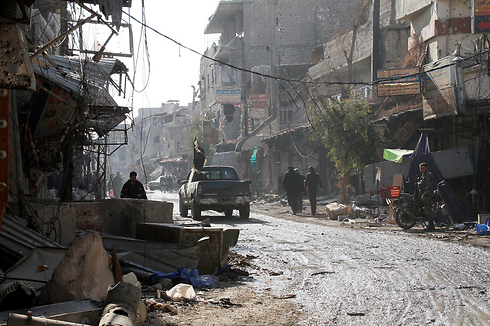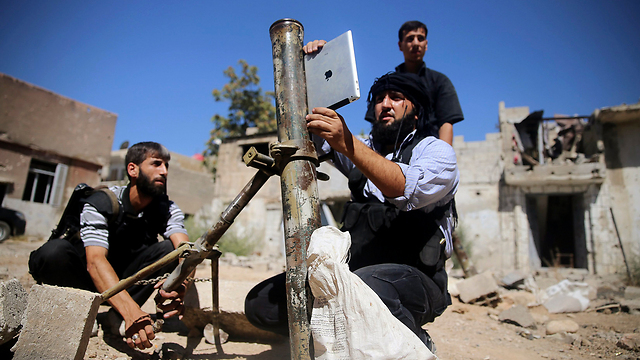Syrian government and opposition negotiators will meet for the first time since the start of the country's 32-month-old war in Geneva on January 22, the UN announced Monday. UN Secretary-General Ban Ki-moon called the landmark conference "a mission of hope" to end the civil war.
Related stories:
- Nasrallah: Hezbollah will stay in Syria as long as needed
- Syria Islamists unite as faction-fighting goes on
- Syria: 31 troops killed by blast near Damascus
As top diplomats huddled in Geneva last week for the Iran negotiations, they were also laying groundwork for the Syria conference, with Arab League envoy Lakhdar Brahimi meeting Iranian Foreign Minister Mohammad Javad Zarif and Russian counterpart Sergei Lavrov.
"The Secretary-General expects that the Syrian representatives will come to Geneva with a clear understanding that this is the objective, and with a serious intention to end a war that has already left well over 100,000 dead, driven almost nine million from their homes, left countless missing and detained, sent tremors through the region and forced unacceptable burdens on Syria's neighbors," said the UN spokesperson Martin Nesirky.
"The conflict in Syria has raged for too long. It would be unforgivable not to seize this opportunity to bring an end to the suffering and destruction it has caused," Ban said through his spokesperson.
Ban praised the efforts of Russia, the United States and UN-Arab League envoy Lakhdar Brahimi in pressing for the conference which has been delayed several times.
However, rebels in Eastern Ghouta east of Damascus do not seem to have peace talks on their mind and are trying to break the army siege on opposition areas there, taking over several small villages and checkpoints, the Syrian Observatory for Human Rights reported.
"In the past three days, the rebels have taken over small villages and checkpoints east of Damascus and southeast of Aleppo, after launching counter-offensives on those fronts," said Observatory director Rami Abdel Rahman.
Southeast of Aleppo, rebels also battled troops after a recent advance by the army, he added.
Troops loyal to Bashar Assad had for several weeks gained the upper hand against the rebels at key battle fronts across the war-ravaged country. "Now the army is no longer advancing there," he added.
Fighting on Monday was focused around Marj, east of Damascus, and Khanasser, southeast of Aleppo, Abdel Rahman said.
Rebels regroup
Opposition activists have described the latest counter-offensive as a bid to break the siege, which has prevented weapons and humanitarian supplies from entering the Eastern Ghouta area.
The main opposition, National Coalition, has linked the rebel advance to Friday's merger of Syria's biggest Islamist rebel groups, which did not include jihadists.
According to the Observatory, on Sunday the army used intense firepower to fight back, launching air strikes near Aleppo and around Damascus, while firing a surface-to-surface missile against Eastern Ghouta.
A security source in Damascus meanwhile told AFP "the armed men (rebels) are trying to secure some progress, but the tight ring around them means they will not succeed."
The source also said the army was conducting "operations... to secure the areas that were reclaimed" from rebel hands in southeastern Aleppo in recent weeks.
Pro-regime Al-Watan newspaper said the army was deploying troops in the majority Christian town of Deir Attiyeh, north of Damascus, "in preparation to take it back" from rebel hands.
Located in the strategic area of Qalamoun along Lebanon's border, Deir Attiyeh was taken over last week by rebels, among them jihadists.
During the last two and a half years, Syria's civil war has cost more than 120,000 lives and forced millions of Syrians to flee their homes.
The so-called Geneva II conference is meant as a follow-up to one held in June 2012, where world powers issued a call for a Syrian transition government.
The international community has struggled to broker talks between the regime of Syrian President Bashar Assad and the rebels battling him since a bloody March 2011 crackdown on Arab Spring-inspired protests.
- Receive Ynetnews updates
directly to your desktop


















